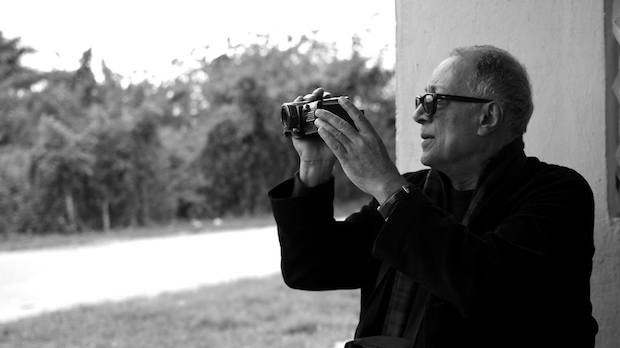Learning by Making
Filmmaking with Abbas Kiarostami
The filmmaker magazine recently published an article about our filmmaking experience in Cuba with Abbas Kiarostami. Written by my talented friend Cameron Bruce Nelson, this piece also had insights from some other participants including myself discussing the impact of Kiarostami’s style on our creative process as well as our worldviews.
To read the Filmmaker article entirely please check the link in the bottom of this page, but to read the unedited bulk of my segment please read my personal experience below:
Although born and raised Armenian, going to school in Iran made me a bilingual from a very early stage. Something I wasn’t really happy about because the two languages I knew weren’t really internationally useful or global. Immigration to US improved my English and film school experience definitely developed my cinematic language, but up until the workshop in Cuba with Abbas Kiarostami, I never got the opportunity to use my film terminology knowledge of both Farsi and English in conversations. Due to high number of English speakers I ended up being appointed to help translate the lectures simultaneously from Farsi to English as Kiarostami would speak. Consequently after so many years of being away from Farsi it was a great pleasure to hear one of my all time favorite directors speaking a language I used to know so well. I had fallen in love with Farsi literature in school not only through poems of famous Persian poets such as Hafez, Ferdusi or Rumi but also reading the modern poetry of Nima, Shamloo and Sepehri, however there was a huge gap between the elevated language of their works and what I would normally hear here and there in the streets among the ordinary people. The Iranian national television and their Los Angeles “counterparts” had together degraded the wonderful Farsi language to the lowest possible level of superficiality. And naturally connections between me and Farsi language eventually decreased as I spent more time away from Farsi media, reading in English and Armenian in later years, however these all suddenly shifted when Kiarostami started speaking for the first time in Cuba. I instantly noticed a very delicate balance of conversational Persian, masterfully combined with allegories and expressions which I had only read in books and poems. It wasn’t only the choice of words but also the rhythm that he would speak that made his every statement so one of a kind. Combine those with the cinematic Farsi terms mostly derived from French and the result was technical poetry!

As I was translating his words, I grimly realized how far apart I’ve fallen from this fascinating language that I used to read on daily basis and how proud and lucky I was this time around to recap. Due to a negative image of Iran in the western media, speaking the language or knowing that ancient culture had never seemed like an advantage in my shifted mind for quite some time, but being confronted with a man who had come from that very same country with so much quality and positivity that could just as well be attributed to the Persian culture, made me fall back in love with Persian all over again.
I arrived to Cuba workshop, presenting myself as an Armenian from US and went back to my Los Angeles home as a proud Armenian Iranian by being reassured that Iran is not entirely what is propagated in the mainstream media but it also consist of all the beautiful things that I saw in Abbas, in his films, in his knowledgeable translator Ahmad and the two other Iranian participants, Saman and Sholeh who I was so lucky to meet.
In addition, learning about his in depth knowledge of poetry and film and recalling his last few works made me realize that it would only take a bold risktaker to put aside one of their most staggering tools (Language) to experiment with cultures and languages that he could barely exercise his control over. I admired the drive in him of trying something new and not being afraid to risk a successful career by jumping inside a virtual pool in which his most vital survival skills, being the language, was useless. A decision so many established filmmakers would never consider simply because the production companies funding them wouldn’t approve. This aspect of Kiarostami proves that he is one of the best living examples of the auteur theory at times that big studios have fully captured the control of the most of the high level productions. An inspiring phenomenon, that makes every creative rethink their career goals.
Thanks for reading this. Below please see a link to the actual article in the Filmmaker magazine. http://filmmakermagazine.com/97552-learning-by-making-with-abbas-kiarostami/#.VtS50zbErAU

